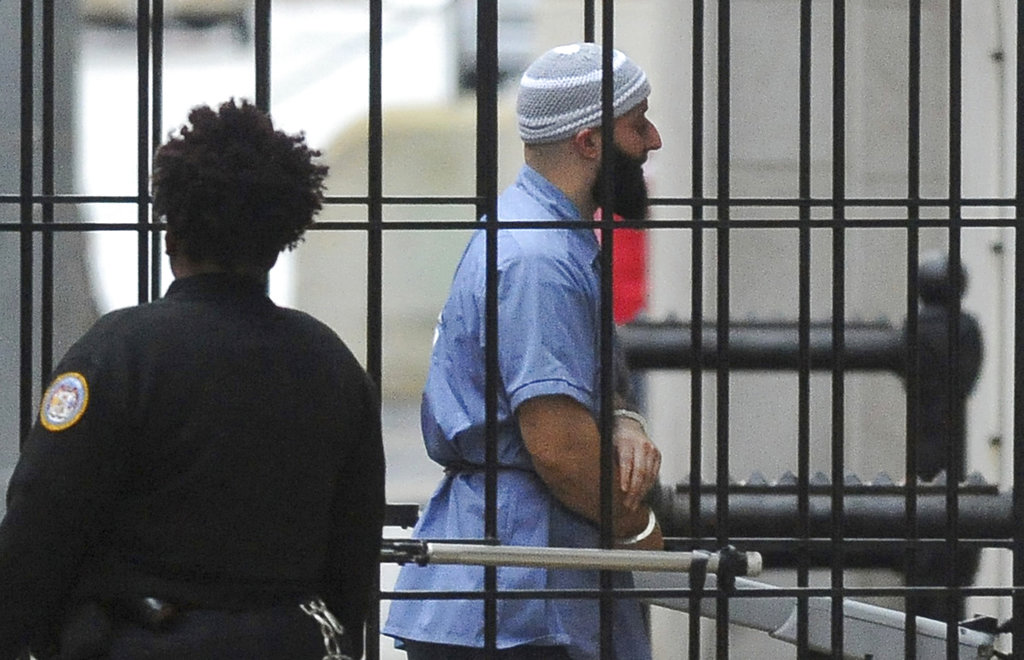Baltimore prosecutors are no longer convinced of Adnan Syed’s guilt in a murder case, stating new evidence may point to alternate suspects.
The Baltimore City State’s Attorney’s Office, under Marilyn Mosby, filed a court document on Wednesday requesting that a circuit court vacate Syed’s conviction after a nearly yearlong investigation discovered evidence pointing to two other possible suspects.
Syed, 39, was convicted in 2000, when he was 17 years old, for the murder of his ex-girlfriend Hae Min Lee, 18, in February 1999. Lee’s body was found buried in a park, and the cause of death was determined to be manual strangulation. Syed was tried as an adult for the crime and sentenced to life in prison.
In the interest of fairness and justice, the state wrote, it is requesting that, “at minimum,” Syed be given a new trial.
“To be clear, the State is not asserting at this time that Defendant is innocent,” the document stated. “However, for all the reasons set forth below, the State no longer has confidence in the integrity of the conviction.”

Two alternate suspects were “known at the time of the investigation of the case and not properly ruled out,” the state wrote in the filing. However, during a re-investigation of the case, new evidence suggested the two alternate suspects had “motive and/or propensity to commit this crime.”
The state would not divulge any personal information related to the alternate suspects.
GORSUCH SAYS REPORT COMING ON SUPREME COURT LEAK INVESTIGATION
During the investigation, it was found that one of the suspects had made reference to harming and killing Lee, and one of them also engaged in serial rape and sexual assault. Lee’s car was found located directly behind the home of one of the suspect’s family members, new information also revealed.
“The State avers that considering the totality of evidence now available, the information about an alternative suspect would have been helpful to the defense,” the filing stated.
Overall, the state said the evidence against Syed was “not overwhelming and was largely circumstantial.”
This is not the first attempt to vacate Syed’s conviction. In 2016, Brown appealed to the court for Syed’s case to be vacated based on unreliable cellphone data and insufficient counsel regarding Syed’s former attorney, Cristina Gutierrez. She was cited as failing to call on an alibi witness during the original trial, among other misgivings.
The conviction was vacated by Baltimore City Circuit Court Judge Martin Welch, who agreed with Brown’s claims and concluded that the state did not present a solid case against Syed. The Maryland Court of Special Appeals upheld the decision in 2018. However, a year later, the conviction was reinstated after a 4-3 vote in the Maryland Court of Appeals.
On March 10 of this year, both the state and defense filed a joint petition asking for DNA analysis, specifically touch DNA, on the victim’s clothing that had not been previously tested. The state is still awaiting lab results for certain items, per the filing.
Syed’s case was the focus of the first Serial podcast episode, with the podcast tweeting that Wednesday’s decision was a “big deal” for Syed and his attorneys.
This is big news. For the first time, Baltimore prosecutors are saying they don’t have confidence in Adnan Syed’s conviction and are asking for his release. https://t.co/5Z4VkWcunY
— Serial (@serial) September 14, 2022
C. Justin Brown, Syed’s former attorney, tweeted his approval of the state’s request as well, stating he “couldn’t be happier.”
I couldn’t be happier for my former client!#freeadnan
— Justin Brown (@CJBrownLaw) September 14, 2022
CLICK HERE TO READ MORE FROM THE WASHINGTON EXAMINER
Mosby said in a press release that since the beginning of her administration, her prosecutors have sworn to “aggressively advocate” for victims of crime. However, she also believes in correcting the “wrongs of the past where doubt is evident.”
“We believe that keeping Mr. Syed detained as we continue to investigate the case with everything that we know now, when we do not have confidence in results of the first trial, would be unjust,” Mosby said.
